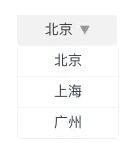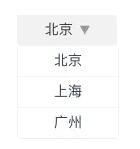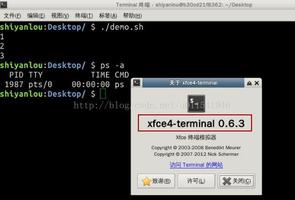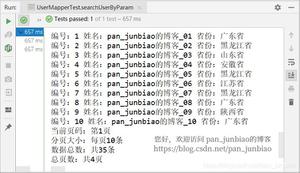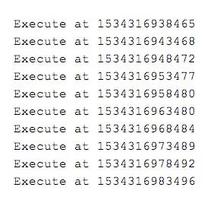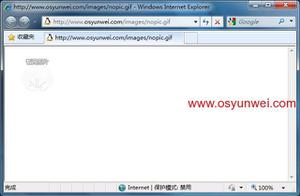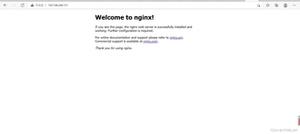iOS使用UICollectionView实现列表头部拉伸效果
本文实例为大家分享了iOS实现列表下拉放大效果展示的具体代码,供大家参考,具体内容如下
先看效果图
突然发现没有做出来之前都觉得蛮难的,做出来之后就觉得So Easy 大家都有这样的感触吧
做这个就重写 UICollectionViewFlowLayout 的几个方法就可以
OC版本
创建一个类 CustomCollectionViewFlowLayout 继承 UICollectionViewFlowLayout
//
// CustomCollectionViewFlowLayout.m
//
//
// Created by GongHui_YJ on 16/8/4.
// Copyright © 2016年 Yangjian. All rights reserved.
//
#import "CustomCollectionViewFlowLayout.h"
@implementation CustomCollectionViewFlowLayout
- (BOOL)shouldInvalidateLayoutForBoundsChange:(CGRect)newBounds
{
return YES;
}
- (NSArray *)layoutAttributesForElementsInRect:(CGRect)rect {
UICollectionView *collectionView = [self collectionView];
UIEdgeInsets insets = [collectionView contentInset];
CGPoint offset = [collectionView contentOffset];
CGFloat minY = -insets.top;
NSArray *attributes = [super layoutAttributesForElementsInRect:rect];
if (offset.y < minY) {
CGSize headerSize = [self headerReferenceSize];
CGFloat deltaY = fabsf(offset.y - minY);
for (UICollectionViewLayoutAttributes *attrs in attributes) {
if ([attrs representedElementKind] == UICollectionElementKindSectionHeader) {
CGRect headerRect = [attrs frame];
headerRect.size.height = MAX(minY, headerSize.height + deltaY);
headerRect.origin.y = headerRect.origin.y - deltaY;
[attrs setFrame:headerRect];
break;
}
}
}
return attributes;
}
@end
在控制器中使用 先导入头文件
// 创建collectionView
CustomCollectionViewFlowLayout *flowLayout=[[CustomCollectionViewFlowLayout alloc] init];
[flowLayout setSectionInset:UIEdgeInsetsMake(0, 0, 10, 0)];
[flowLayout setItemSize:CGSizeMake(kScreenWidth / collectionCellW, kScreenWidth / collectionCellW)];
[flowLayout setHeaderReferenceSize:CGSizeMake(kScreenWidth, userInfoImageViewH)];
[flowLayout setFooterReferenceSize:CGSizeMake(kScreenWidth, 83)];
[flowLayout setScrollDirection:UICollectionViewScrollDirectionVertical];
[flowLayout setMinimumInteritemSpacing:0.0];
[flowLayout setMinimumLineSpacing:0.0];
self.homeCollectionView = [[UICollectionView alloc]initWithFrame:CGRectMake(0, 0, kScreenWidth, kScreenHeight - 44)collectionViewLayout:flowLayout];
self.homeCollectionView.backgroundColor = kViewBackgroundColor;
self.homeCollectionView.alwaysBounceVertical = YES;
self.homeCollectionView.showsVerticalScrollIndicator = NO;
//设置代理
self.homeCollectionView.delegate = self;
self.homeCollectionView.dataSource = self;
[self.view addSubview:self.homeCollectionView];
// 注册表头
[self.homeCollectionView registerClass:[YJHeaderCollectionReusableView class] forSupplementaryViewOfKind:UICollectionElementKindSectionHeader withReuseIdentifier:kCollectionHeaderView];
// 注册表尾
[self.homeCollectionView registerClass:[UICollectionReusableView class] forSupplementaryViewOfKind:UICollectionElementKindSectionFooter withReuseIdentifier:kCollectionFooterView];
Swift版
喜欢swift 不需要导入头文件那么麻烦
//
// CustomCollectionViewFlowLayout.swift
//
//
// Created by GongHui_YJ on 16/8/4.
// Copyright © 2016年YangJian. All rights reserved.
//
import UIKit
class CustomCollectionViewFlowLayout: UICollectionViewFlowLayout {
override func shouldInvalidateLayoutForBoundsChange(newBounds: CGRect) -> Bool {
return true
}
override func layoutAttributesForElementsInRect(rect: CGRect) -> [UICollectionViewLayoutAttributes]? {
let collectionView = self.collectionView
let insets = collectionView?.contentInset
let offset = collectionView?.contentOffset
let minY = -((insets?.top)!)
let attributesArray = super.layoutAttributesForElementsInRect(rect)
if offset!.y < minY {
let headerSize = self.headerReferenceSize
let deltaY = CGFloat(fabsf(Float((offset?.y)! - CGFloat(minY))))
for attrs:UICollectionViewLayoutAttributes in attributesArray! {
if attrs.representedElementKind == UICollectionElementKindSectionHeader {
var headerRect = attrs.frame
headerRect.size.height = max(minY, headerSize.height + deltaY)
headerRect.origin.y = headerRect.origin.y - deltaY
attrs.frame = headerRect
break
}
}
}
return attributesArray
}
}
在控制器 viewDidLoad方法实现
let customFlowLayout = CustomCollectionViewFlowLayout()
customFlowLayout.headerReferenceSize = CGSizeMake(kScreenWidth, 203)
customFlowLayout.footerReferenceSize = CGSizeMake(kScreenWidth, 83)
customFlowLayout.minimumInteritemSpacing = 0
customFlowLayout.minimumLineSpacing = 0
customFlowLayout.itemSize = CGSizeMake(kScreenWidth / 3.000006, kScreenWidth / 3.00006)
customFlowLayout.sectionInset = UIEdgeInsetsMake(0, 0, 10, 0)
self.homeCollectionView.setCollectionViewLayout(customFlowLayout, animated: true)
self.homeCollectionView.backgroundColor = kViewBackgroundColor
self.homeCollectionView.alwaysBounceVertical = true
let nib = UINib(nibName: "CommonCollectionViewCell", bundle: nil)
self.homeCollectionView.registerNib(nib, forCellWithReuseIdentifier: cellId)
// 注册表头表尾
let headerNib = UINib(nibName: "HeaderCollectionReusableView", bundle: nil)
self.homeCollectionView.registerNib(headerNib, forSupplementaryViewOfKind: UICollectionElementKindSectionHeader, withReuseIdentifier: collectionHeaderId)
self.homeCollectionView.registerClass(UICollectionReusableView.classForCoder(), forSupplementaryViewOfKind: UICollectionElementKindSectionFooter, withReuseIdentifier: collectionFooterId)
注:不要实现UICollectionViewDelegateFlowLayout的代理方法了。
以上是 iOS使用UICollectionView实现列表头部拉伸效果 的全部内容, 来源链接: utcz.com/z/313256.html


